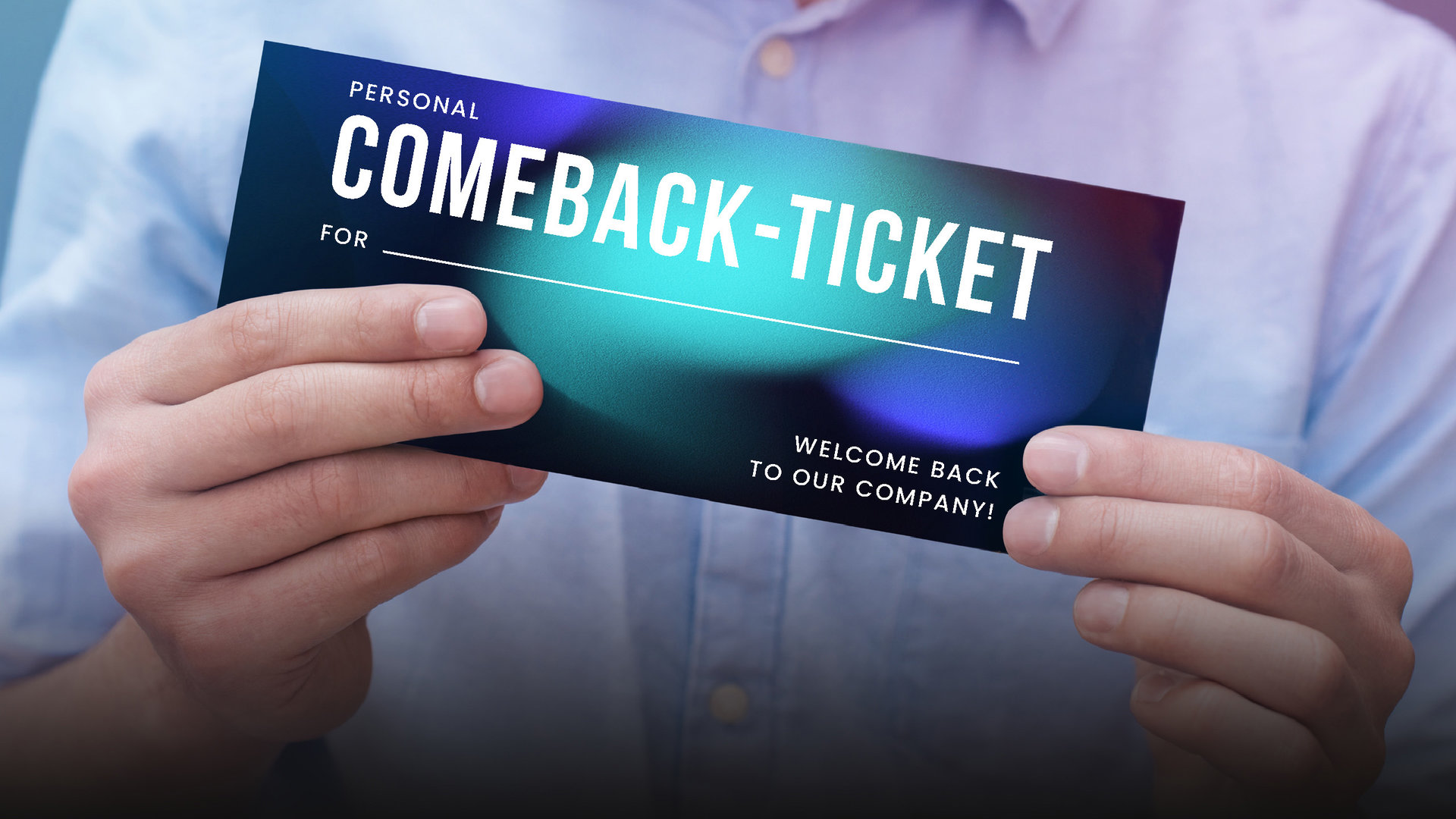
Employer branding for offboarding
Germans have around 39 years of working life ahead of them (Statista). On average, we remain loyal to our employer for 11 years (study by the Institute of the German Economy, Personalwirtschaft). However, the trend is downward. Academics and especially the younger generation of workers like to change employment and industry more frequently. Employment biographies are increasingly less "classically linear". The desire for a change in career, the expansion of skills, relocations or new life plans can be the deciding factors for a change. Due to the current labour market situation, very few employed people are afraid of not finding a new job. This is in stark contrast to employers, who spend between 107 and 263 days filling vacancies, depending on the industry (Statista 2023). Those who engage in targeted employer branding during offboarding strengthen their employer image and increase their chances of attracting new and former talent to the company.
Why is employer branding worthwhile in offboarding?
Most employers put a lot of energy into onboarding. Offboarding is often underestimated in employer branding. It should be a matter of course to say goodbye to former employees in an appropriate manner. Good interpersonal relations alone require this.
Here we have put together seven good reasons why it is worth investing in employer branding during offboarding.
- positive corporate culture
Respectful and supportive offboarding shows that the company values its employees and cares about their well-being - even after their employment contract has ended. In particular, dealing appropriately with departing workers illustrates a positive and people-centred corporate culture. This is also felt by the remaining talent. - valuable feedback
Those who leave the company address grievances more openly and provide an unvarnished insight into the working atmosphere. Through exit interviews and other forms of communication during offboarding, companies can receive valuable feedback from departing employees. Those who accept this feedback professionally have the chance to improve the working environment and atmosphere in the company in the long term. - smooth handover
Every talent takes their work experience and job-specific knowledge with them when they leave. Good offboarding can help ensure that tasks and responsibilities are handed over smoothly to the appropriate successor. This contributes to higher productivity and continuity in the company. - network building
No one knows where your former employees will end up. There is an old saying that you always see each other twice in life. Perhaps there will be professional contacts elsewhere? In the context of positive offboarding, former employees are more likely to continue to support you or to pass on relevant information. - positive word of mouth
Those who leave a company without resentment and even have a positive experience are more likely to mention it positively to friends, family and new colleagues. Perhaps the former employee will even become a brand ambassador. This strengthens the company's image and may even attract new applicants. - reduce reputational risk
A negative offboarding experience can lead to former employees mentioning the company negatively on social networks or criticising it on rating platforms. This damages the employer brand. This is because new talents often search for information about the potential new employer by internet. If there are a lot of negative statements, the applicants will change their minds. - winning back talents
Never say never. Positive offboarding experiences can help former employees return to the company in the future, for example, if their professional or personal circumstances change. According to the KÖNIGSTEINER Group's labour market study on "Boomerang Applications", 43 percent of those surveyed could imagine returning. 17 percent are considering applying again, while 21 percent are waiting for their former employer to actively contact them. However, only 5 percent of the respondents have returned so far. So there is a lot of potential for recruiting in so-called re-hiring or boomerang hiring.
Top 10 employer branding measures in offboarding
How can companies make their employer brand visible in the offboarding process, make the offboarding experience positive and strengthen their employer brand? Here we present ten different possibilities:
- respectful communication
It's not what you say, but how you say it. No matter from which side the dismissal request comes - the collegial environment and, if applicable, the customers must be informed. The way in which the departure from the company is communicated plays an important role. Transparency, honesty, respect and, of course, timely information are important. Expressing grievances and sensitivities does not look professional! - possibility for talks
We recommend that you schedule exit interviews. Why? Exiting employees are given the opportunity to share their experiences in the course of the employee life cycle and to express their opinions. On the one hand, this shows appreciation, on the other hand, it offers the opportunity to say goodbye in a positive way and also provides valuable feedback for your future employer branding. Your former employee may also be able to give you a hint as to who from the company or your circle of acquaintances could fill the vacancy that arises. - job search support
If your talent has been made redundant for operational reasons, offer support in finding a new job. This can be done, for example, through outplacement counselling or by providing contacts in the industry. - job reference and letter of recommendation
Especially if the dismissal was made by the company, a meaningful and correct reference is needed quickly. Do not let this process slide, it fuels frustration and dissatisfaction. If a particularly valued talent leaves you, you can also issue a letter of recommendation. In any case, be sure to use common and appropriate wording. - allow enough time for handover
A smooth handover of the outgoing person's duties and responsibilities to his or her successors takes time. It is advisable to allow this time for two reasons: firstly, the handover can be carried out comprehensively, and secondly, it prevents the feeling of being unwanted. It may also be helpful to have a handover guide so that nothing is forgotten. This supports the handover process and prevents excessive demands. - offboarding checklist
Many companies have a checklist for onboarding. For offboarding, a checklist can also be helpful to carry out the process in a structured way. - an appreciative farewell
Especially when employees have been with the company for a longer period of time, good manners demand that they be given an appreciative farewell. This can be done with a farewell party, a farewell gift or simply a message of thanks. It is also advisable to say a few words appreciating the departing person's achievements in the company and wishing them all the best for the future. - alumni network
An alumni network can be used to maintain contact with former employees. This can be achieved through regular meetings, newsletters or social media groups. Some employers go even further and offer opportunities for training and professional development, even after leaving the company. For example, an alumni mailing list could be set up to highlight online courses, workshops or networking events offered by the former company. - encourage positive reviews
If offboarding is satisfactory on both sides and the separation is consensual, former talents can be encouraged to provide positive testimonials or reviews on evaluation platforms. - Promote the return option
If you were particularly happy with the departing talent and he or she was a good fit for the team, you can actively offer a return option. One concept that has gained importance in recent years is the so-called "golden return ticket".
"Golden return ticket" as an offboarding strategy
The concept of the "golden return ticket" or "comeback ticket" is an offboarding strategy where former employees are given the opportunity to return to the company in the future. This strategy acknowledges that people often take on various roles throughout their careers and gather different experiences that can benefit both them and their former employers. The golden return ticket symbolizes an open door for former employees who are interested in returning. There are various ways to implement this. For instance, some companies design cards reminiscent of train tickets, complete with names, positions, and job responsibilities. With these cards, former employees can be rehired immediately upon request.
The top 7 advantages of the golden return ticket at a glance:
- positive employer branding
The golden return ticket shows former employees that their contributions were valued and that they are welcome in the future. This reinforces a positive employer image of appreciation and recognition, attracting old and new candidates through word-of-mouth. - cost savings in candidate search
Rehiring former employees can be more cost-effective than hiring new talents as the contacts in an alumni pool are already in place and don't need fresh research. - faster onboarding on rehire
Alumni, familiar with the company culture and internal processes, can be reintegrated faster than external talents. - networking effect
Former employees bring new contacts and networks that can benefit the company. - known skills
The personality, soft skills, and hard skills of former employees are already known. This prevents potential hiring mistakes and makes it easier to determine if the talent fits into the team. Additionally, they might have acquired new skills in the meantime which can further benefit the company. - lower turnover risk
Returning employees already have a clear perception of the company and its culture. Those who choose to return are likely to stay. - positive signalling
The return of former employees sends a positive message to long-standing staff, indicating the ongoing attractiveness of the employer in the job market. It showcases the company's appreciation and how loyalty pays off, endorsing the positive impact of the company culture and boosting internal morale.
Who comes back and why?
The study "Boomerang Applications" indicates that returning to a former employer is an option especially for the age groups 18-29 (20%) and 30-39 (22%). One in five considers reapplying. However, if the former employer takes the initiative and actively contacts the past employees, the willingness to return is even higher, particularly with men at 27%.
The main reasons for returning are: familiarity with work routines (89%), social connection with old colleagues (66%), a better job scope than currently (64%), and a salary jump due to additional experiences (61%). The previous leadership style is rarely missed (49%).
Conclusion
First impressions matter, but the last ones linger. Given the current developments in the job market, employer branding is more crucial than ever. Companies should focus on bidding farewell to former employees with appreciation during offboarding and carry it out in a structured manner. If former employees leave content, they act as brand ambassadors even after departure. Those who leave with resentment pose a potential reputational risk for the employer.
Additionally, experience proves the old adage: "You always meet twice in life!" And with effective employer branding measures during offboarding, you're well-prepared for that moment.
As a full-service communication agency specializing in employer branding, we are here to assist you in all matters related to employer branding – from recruiting to onboarding and offboarding.
Contact us anytime:
Katrin Jetter
Senior Consultant
0711/ 925388-10
